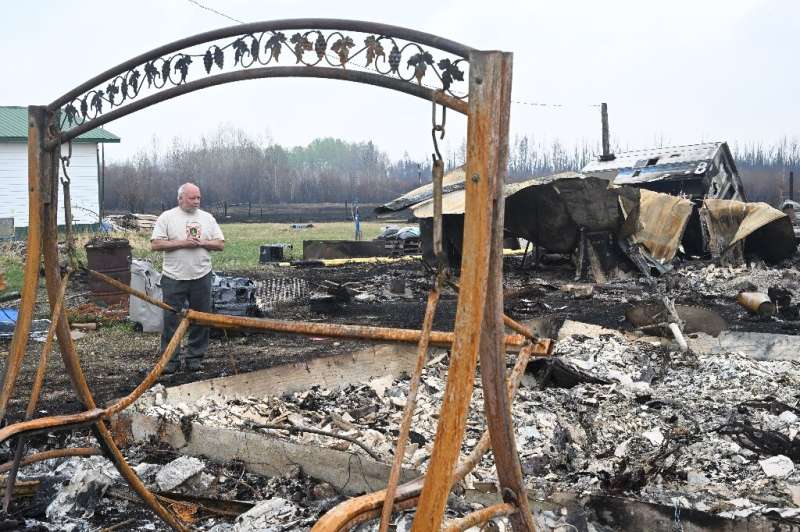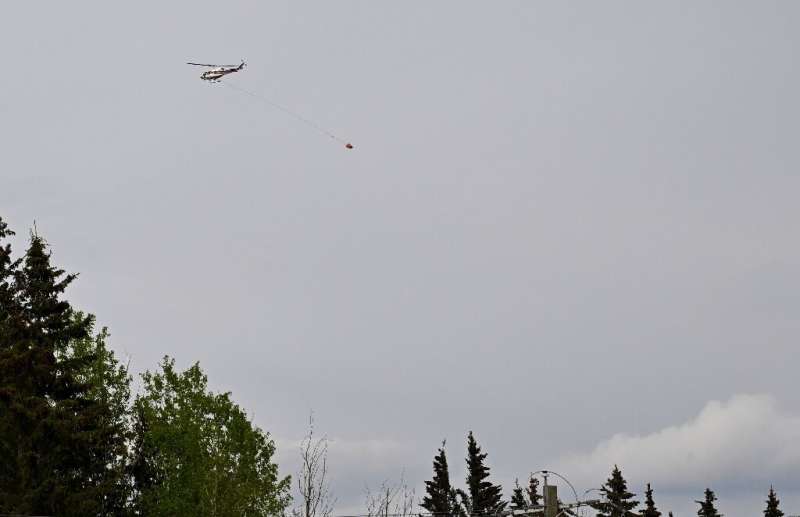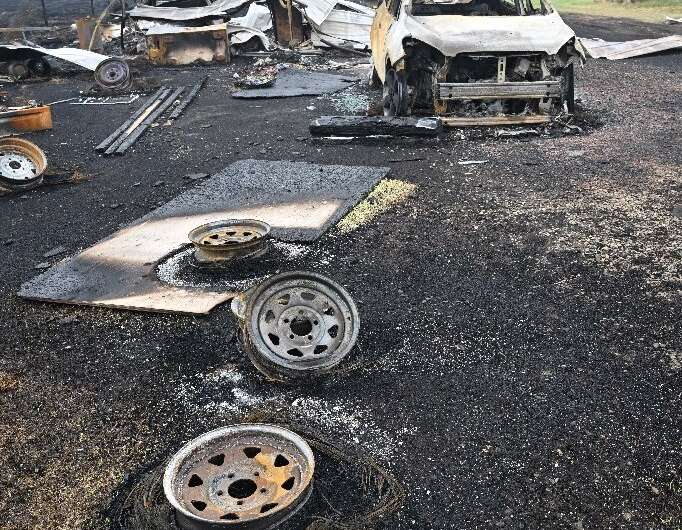This article has been reviewed according to Science X's editorial process and policies. Editors have highlighted the following attributes while ensuring the content's credibility:
fact-checked
reputable news agency
proofread
Western Canada seeks urgent help to fight wildfires

Canada struggled on Monday to control wildfires that have forced thousands to flee, halted oil production and razed towns, with the western province of Alberta calling for federal help.
Some 30,000 people were ordered to leave their homes over the past three days, as nearly 100 fires flared across the province—including 27 out of control.
Federal disaster officials and the military were on standby, after Alberta leader Danielle Smith spoke with Prime Minister Justin Trudeau to formally ask for assistance.
"Canadians stand with the people of Alberta as they deal with these terrible, terrible wildfires," Trudeau told reporters in Ottawa.
"We were watching images from the communities affected by these wildfires and I assured Danielle that we will be there to help," he said.
Details of what supports would be made available were not immediately released.
In Alberta, firefighters prioritized dousing flames threatening homes and businesses. Many roads near the provincial capital Edmonton were blocked off as temporary shelters welcomed evacuees.
Officials said 390,000 hectares had burned, patients and long-term care residents had to be relocated and many schools were closed.
Oil firms—including Vermilion Energy and Crescent Point Energy—announced temporary shutdowns of operations, slashing production by more than 125,000 barrels of oil per day.
Many residents and oil workers rode to safety in motorhomes or with campers in tow, and set up in empty parking lots.

Others are staying with friends or family, like Jerry Greiner, a resident from Dayton Valley, west of Edmonton, the capital of Alberta.
"We could see the smoke on Friday and there was a pretty strong wind," the 55-year-old told AFP, his eyes tearing up as he recounted receiving the order to evacuate that night.
"We quickly grabbed our bags (and went) to our friends' house. About 12 people stayed there," he said. This was the first time Greiner has ever had to flee wildfires.
Dayton Valley, a small town of 7,000, was completely abandoned. Trees and grass fields all around were blackened by the fires, and smoke billowed from a few charred buildings, but most of the homes appeared intact, observed an AFP reporter.
Black smokey skies
It was not clear when residents would be permitted to return.
Resident Randy Braun, 57, said the fire chief told locals it would be "at least a week minimum."
Smith said the fires "may continue on for several months," but added that evacuation orders had been lifted in the morning for three communities.
Kathy Bereuwski, 61, escaped with her family and dogs. "The sky," she told AFP, "was pitch black" with smoke and falling ash.
In the northern community of Fox Lake, a fire destroyed 20 homes, a store and a police station. Residents had to be evacuated by boat and helicopter.

The Alberta premier declared a state of emergency on Saturday, calling the wildfire situation "unprecedented."
The province—one of the world's largest oil-producing regions—"has been experiencing a hot, dry spring and with so much kindling, all it takes is a few sparks to ignite some truly frightening wildfires," she said.
Almost all of Alberta as well as much of neighboring Saskatchewan province, parts of British Columbia and a large swath of the Northwest Territories face extreme fire risks.
Two out-of-control wildfires in westernmost British Columbia have also forced residents to evacuate, and authorities have warned they expect strong winds to swell those blazes.
In recent years, western Canada has been hit repeatedly by extreme weather, the intensity and frequency of which have increased due to global warming.
Forest fires in Canada's oil sands region in 2016 disrupted production and forced out 100,000 residents from Fort McMurray, pummelling the nation's economy.
More recently in 2021, British Columbia suffered record-high temperatures over the summer that killed more than 500 people, as well as wildfires that destroyed an entire town.
That was followed by devastating floods and mudslides.
Christie Tucker, a spokesperson with Alberta's wildfire agency, said Monday brought "a continuation of yesterday's break in the hot weather across most of the province, with light scattered showers."
"It's a much needed chance to make progress on some of these powerful, challenging wildfires," she said. "But we're not out of the woods yet."
© 2023 AFP




















